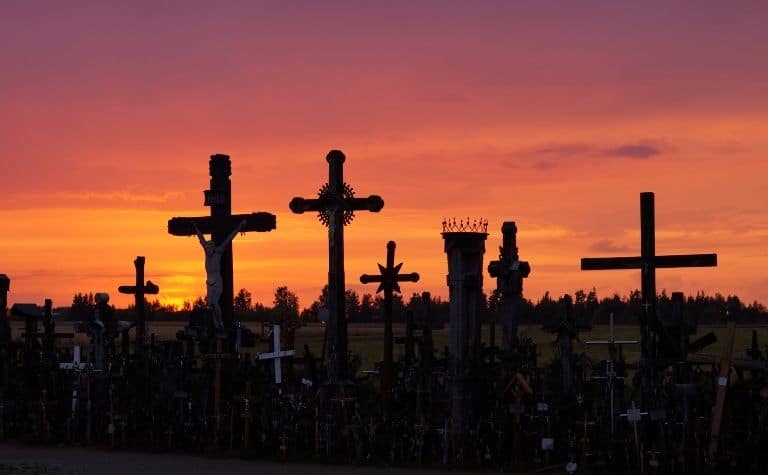When denominations and churches have similar titles, but different beliefs, it can lead to confusion. For example, though historical (also called “classic” or ” orthodox”) Pentecostalism and Oneness Pentecostalism have similar names, they are more like different religions than different denominations.
Historic Pentecostalism, like all orthodox Christians, believes that God is a Trinity. Oneness Pentecostalism believes the Father, Son, and Holy Spirit are different manifestations of the same person. Historic and Oneness Pentecostalism also have different beliefs about baptism and salvation.
When did Oneness Pentecostals break away from historic Pentecostalism, and why? What are their disagreements concerning baptism and salvation? What does each tradition believe about speaking in tongues? Which tradition has more adherents? Keep reading to learn the answers to these questions and others.
Also, see Pentecostalism vs. Apostolic: What’s the Difference? to learn more.

Christian Pentecostalism and Oneness Theology Compared
Though “Oneness Pentecostalism” and “United Pentecostalism” are often used interchangeably, there is a difference between the terms. “Oneness” describes a set of theological beliefs emphasizing that God isn’t a Trinity.
“United Pentecostalism” is the name of the largest Oneness Pentecostal denomination. (Also see the full article Do Oneness Pentecostals Believe in the Trinity?)
| OVERVIEW | Pentecostalism | Oneness Pentecostalism |
|---|---|---|
| Founded | Historians conventionally date the origin of the modern Pentecostal movement to the Azusa Street Revival in Los Angeles, California, in 1906. | Historians date the origin of Oneness Pentecostalism to 1913 in Los Angeles, California, when a faction arose that challenged the orthodox theology of the burgeoning Pentecostal movement. |
| Meaning of the name | The word “Pentecostal” comes from the word “Pentecost,” which describes the unique and powerful outpouring of the Holy Spirit upon the early church, as recorded in Acts 2. | “Oneness” refers to the doctrine that the Father, Son, and Holy Spirit are different modes of the same person. The doctrine is sometimes referred to as “modalism.” Orthodox Christianity believes that they are three separate persons.* |
| Founder | Pentecostalism doesn’t have a single founder. All of the early influencers (see below) contributed to the establishment of the modern movement. | Though modalists existed in the early church (and were rebuked), the modern expression arose in the preaching of Canadian Pentecostal Robert T. McAlister in 1913. |
| Branch of Christianity | Pentecostalism is Protestant. Many of the ideas it embraces are rooted in the Protestant Reformation, led by Martin Luther of Germany, Ulrich Zwingli of Switzerland, and John Calvin of France. | Historically, the orthodox Protestant tradition, including historic Pentecostalism, has considered Oneness Pentecostalism a heresy as opposed to a denomination within the Christian faith.** |
| Early influencer(s) | William J. Seymour (1870-1922), Agnes Ozman (1870-1937), Charles Parham (1873-1939) | Frank Ewart (1876-1947), Glenn Cook, Tommy Tenney, David K. Bernard |
| Significant writing outside the Bible | Pentecostalism doesn’t have any literature that is unique to its tradition that is of great significance to the establishment and definition of the movement. It generally values the classic literary works of Protestantism. | The Oneness of God by David K. Bernard, other Bernard books |
| Organization | Historically, Pentecostalism isn’t a denomination per se but a belief system that certain denominations hold. The largest Pentecostal denomination is the Assemblies of God. | Some Oneness Pentecostal groups adhere to strict lifestyle standards related to their dress, appearance, and involvement in society. |
| Divisions | Disagreements between Pentecostals often include the doctrine of perfectionism. For example, the Assemblies of God disagrees with the Church of God (Cleveland, Tennessee) about perfectionism. | Some Oneness Pentecostal groups adhere to a strict set of lifestyle standards related to their dress, appearance, and involvement in society. |
| Theological and Social worldview | Pentecostal denominations and churches tend to be conservative theologically and concerning social issues. | Oneness Pentecostals are generally conservative. |
| Adherents | 644 million | 24 million |
*The United Pentecostal Church International states:
There is one God, who has revealed Himself as Father; through His Son, in redemption; and as the Holy Spirit, by emanation. Jesus Christ is God manifested in flesh. He is both God and man. (See Deuteronomy 6:4; Ephesians 4:4-6; Colossians 2:9; I Timothy 3:16.)
**Why do many Christians consider Oneness Pentecostalism heretical? Orthodox Protestantism has historically considered Oneness Pentecostalism heretical because they reject the Triune nature of God and believe that salvation isn’t the result of God’s grace through a person’s faith and in Christ alone but also requires full-immersion water baptism, speaking in tongues, and good works.
Also, see Do United Pentecostals Wear Makeup and Jewelry? to learn more.
List of 11 Oneness Pentecostal Denominations
- Apostolic Assemblies of Christ
- Apostolic Assembly of the Faith in Christ Jesus
- Apostolic Gospel Church of Jesus Christ
- Apostolic Overcoming Holy Church of God
- Assemblies of the Lord Jesus Christ
- Bible Way Church of Our Lord Jesus Christ
- Church of Our Lord Jesus Christ of the Apostolic Faith
- Pentecostal Assemblies of the World
- Pentecostal Churches of Christ
- True Jesus Church
- United Pentecostal Church International
Note: there are hundreds of historic Pentecostal denominations. The Assemblies of God is the largest. (Also see Why Do United Pentecostals Have Long Hair?)

Differences About God, the Bible, Salvation, and More
| Pentecostalism | Oneness Pentecostalism | |
|---|---|---|
| God | Historically, Pentecostals are devout Trinitarians. They believe there is one God and that the Father, Son (Jesus Christ), and Holy Spirit are each fully God. | God is one person who manifested as the Father, Son, and Holy Spirit at different times in history. |
| The Bible | Pentecostals believe God inspired the biblical authors. Many conservatives use the term “inerrancy” to describe the nature of the text. | Oneness Pentecostals believe God inspired the Bible. |
| View of the atonement | Pentecostals believe that Jesus is the second person of the Trinity; they hold to “penal-substitutionary atonement,” which means Jesus’ death paid the price for sin, and on the cross, he took the place of sinners. | Atonement in Oneness theology starts with faith but includes full-immersion, water baptism, and speaking in tongues. Historic Pentecostalism doesn’t teach people to be baptized or speak in tongues to be saved. |
| Salvation | Atonement in Oneness theology starts with faith but includes full immersion, water baptism, and speaking in tongues. Historic Pentecostalism doesn’t teach people to be baptized or speak in tongues to be saved. | Oneness views on salvation don’t conform to orthodox definitions of salvation as held in Arminian, Calvinist, Baptist, Lutheran, or Pentecostal churches.* |
| Sanctification | Some Pentecostals reject the doctrine of perfectionism; others affirm it. | Repentance from sin and living a holy life are critical to salvation, not simply maturation, in Oneness theology. |
| Water Baptism | Pentecostals practice “Believer’s Baptism” as opposed to infant baptism. Baptism isn’t necessary for salvation. | Full-immersion water baptism is necessary for salvation. People must be baptized in Jesus’ name alone. If people were previously baptized in the name of the Father, Son, and Holy Spirit, they must be re-baptized. |
| Communion | Pentecostals believe the bread and the cup are memorials of Christ’s death. They don’t believe Christ is present in the elements in any way. | Oneness Pentecostals partake of the bread and cup as memorials of Christ. |
| Eschatology | Pentecostalism is premillennial, meaning it interprets the 1,000-year period described in Revelation 20:1-6 literally. The millennium occurs after the rapture, the seven-year tribulation, and the Second Coming. | Oneness theology is premillennial. |
Also, see Why Do United Pentecostals Wear Long Dresses and Skirts? to learn more.
*The United Pentecostal Church International states:
The saving gospel is the good news that Jesus died for our sins, was buried, and rose again. We obey the gospel (II Thessalonians 1:8; I Peter 4:17) by repentance (death to sin), water baptism in the name of Jesus Christ (burial), and the baptism of the Holy Spirit with the initial sign of speaking in tongues as the Spirit gives the utterance (resurrection). (See I Corinthians 15:1-4; Acts 2:4, 37-39; Romans 6:3-4.)

References:
[1] Source
[2] Source
[3] Source
Related Questions
Many people know that the terms "Pentecostal" and "evangelical" are associated with Christianity, but they aren't sure exactly how or what the difference is between them. The words may refer to a set...
The Pentecostal and Baptist traditions are two of the most prominent branches of Protestant Christianity. They have many beliefs and practices in common and have more similarities than differences....
